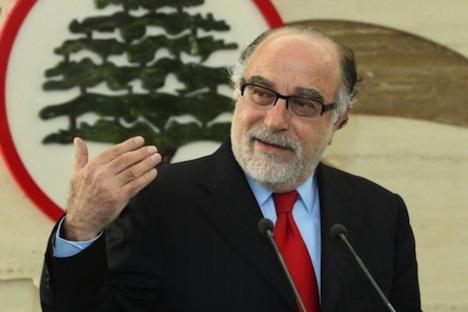No one had high hopes that Tammam Salam would form a new government for Lebanon, and now that he has, the expectations for the Salam government are low — that he’ll see Lebanon through to a presidential election in May and parliamentary elections that have been delayed since last year.![]()
Ten months after the resignation of former prime minister Najib Mikati, Salam has assembled a national unity government that tries to bring together elements within the ‘March 8’ coalition sympathetic to Syrian president Bashar al-Assad, including the Lebanese Shiite militia Hezbollah, and other elements within the ‘March 14’ coalition that have closer ties to the West and sympathies for the Syrian rebels in a civil war that’s soon to enter its fourth year. The Syrian conflict has flared occasionally in Lebanon as well, with anti-Assad Sunni Lebanese and pro-Assad Shiite Lebanese clashing in Beirut and other cities. At the end of 2013, the assassination of prominent ‘March 14’ leader and former US ambassador Mohamed Chatah only underlined the fragility of Lebanon’s security.
The new 24-member Cabinet allocates eight positions to the ‘March 8’ coalition, nine positions to the ‘March 14’ coalition and seven more positions to those close to Salam, top Druze leader Walid Jumblatt and outgoing Lebanese president Michel Suleiman.
Salam must still reach a compromise over his government’s ‘policy statement,’ which will likely include little more than caretaker steps to get Lebanon its next elections and attention to ameliorating the growing crisis for Syrian refugees that have fled their country for Lebanon. His government must then win a confidence vote in the parliament — an outcome not entirely ensured if the two competing blocs can’t agree to even the most basic guiding policy statement.
Last month, former prime minister Saad Hariri, the leader of the Future Movement, a top party within the ‘March 14’ coalition, and the son of the late former prime minister Rafic Hariri, backed away from his opposition to participating in a government that also includes Hezbollah.
Hezbollah, which is openly backing Assad in Syria, now faces violent repercussions throughout Lebanon, with Shiite-dominated areas of Beirut and southern Lebanon increasingly targeted by Sunni militants in retribution for Hezbollah’s efforts in Syria. Hariri, who has been living outside Lebanon for the past two years out of fears for his safety.
The tentative breakthrough between Hezbollah and the Hariri bloc could pave the way for future cooperation over electing Suleiman’s successor, enacting a new election law and, most importantly of all, reducing the sectarian tension that still threatens to engulf Lebanon.
Accomplishing much in the next three months, however, won’t be incredibly easy — meaning that the chief accomplishment of the Salam government might be the fact that it even exists. Continue reading Lebanon’s new government cause for guarded optimism

